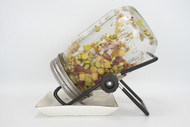Foods For Good Parrot Feather Health
Posted by Feathers, Parrot feathers, bird feathers, feather health on 8/9/2025
Sophie tells us which foods help your Parrot's feathers.

Healthy feathers are a key indicator of a parrot?s overall wellbeing, and nutrition plays a vital role in keeping them vibrant, strong, and well formed. Because feathers are made largely of protein, offering high?quality, bioavailable protein sources such as soaked and sprouted seeds, grains, and legumes is especially beneficial.
Essential amino acids, calcium, Vitamin D3, Vitamin A, and omega?3 fatty acids all support proper feather growth, skin health, and colour, and can be provided through a varied, balanced diet rich in leafy greens, vegetables, seeds, and safe supplements where needed.
Alongside good nutrition, regular bathing, appropriate sunlight or UV exposure, stress reduction, and gentle handling all help support healthy feather condition throughout your parrot?s life.
Parrots are covered in thousands of colourful feathers which can tell you a lot about the health of your bird. These feathers are moulted out and replaced typically 1-2 times a year, and are made of keratin and approximately 90% protein.
Feathers have many functions, from camouflage and insulation, to communication and flight. Good nutrition plays a huge role in feather health, as well as the overall health of your bird.
Feathers should be vibrant, well formed and strong.
Common feathers issues in Parrots include: stress bars, feather destructive behaviours such as barbering and plucking, brittle and weak feathers, dull colours, bronzing from other handling and discolouration due to health issues or nutritional deficiencies.
If you have concerns over your Parrot?s feather health, a check up with your avian vet is recommended.
One of the most important ways to keep your bird?s feathers in excellent conditions is to offer foods with specific benefits to feather condition.
Parrots can be picky eaters, so it might take many attempts to offering a new food before they will try it.
With feathers being formed of a high percentage of protein, this macronutrient is important to feather production and structure. One of the most bioavailable and species appropriate forms of healthy proteins for Parrots are provided through soaking and sprouting seeds, grains and legumes.
If you are unsure about sprouting, you can start by offering a soaking blend ? these are soaked overnight, rinsed thoroughly in the morning and offered as part of your bird?s breakfast.
Sprouting is where you continue the growth process by rinsing and draining twice a day.
Soaking and sprouting starts the germination process within the seeds, grains and legumes which in turn uses up the fat reserves of the food item. This makes sprouts a low fat, high protein food full of enzymes which can also benefit their digestive health.
Sprouted items can be grown on even further into microgreens and grasses. Microgreens are so nutrient rich and packed full of micronutrients that many are even healthier than the adult plant or vegetable that you might offer your bird normally, such as broccoli and radish.
Amino acids are the building blocks of proteins, but there are nine that the body cannot produce and must be sourced through the diet. Hemp seed, chia seeds, soaked and sprouted buckwheat, quinoa and amaranth all contain the nine essential amino acids your bird needs.
Calcium is also needed for feather health and production, as well as many other bodily processes. This essential mineral can be found in a variety of foods including dark leafy greens like kale and spring greens, broccoli, almonds and chia seeds.
Though high in calcium, avoid offering your Parrot dairy products like milk and cheese as these are not easy to digest and can lead to gastrointestinal disruption.
In order for calcium to be absorbed, Parrots must be exposed to Vitamin D3. A diet or environment lacking in Vitamin D3 can lead to poor feather health, brittle bones and behaviour changes.
The best source of Vitamin D3 is natural sunlight ? 20-30 minutes of exposure to sunlight in an aviary, travel carrier or in a harness is enough.
If this isn?t possible, you can provide your bird with a UV lamp above their cage at a safe distance, or add a calcium/D3 supplement to their routine.
Vitamin A is essential for many bodily processes, but sadly a large number of Parrots are deficient in this essential micronutrient. A Vitamin A deficiency can be seen in the overall condition of feathers by being brittle, weak, frayed and even abnormally coloured for their species.
Adding dark leafy greens to a Parrot?s diet, such as kale and spring greens, in addition to yellow and orange vegetables like peppers and carrots, will help to provide Vitamin A in addition to many other beneficial compounds.
A treat which contains Vitamin A that many Parrots enjoy is ethically and sustainably sourced organic palm nut oil. This tasty treat contains Vitamin A, Vitamin E and antioxidants.
Whilst not directly related to feather production, omega 3 fatty acids keep your bird?s skin healthy, which allows for a smooth feather growth process. Omega 3 fatty acids also reduce inflammation in the body which is incredibly important as inflammation is a precursor to many diseases. Healthy sources of omega 3 fatty acids for birds include walnuts, chia seeds, flax seeds and hemp seeds.
In addition to diet, there are many other ways to promote healthy feathers in your Parrots, such as regular bathing, only petting your bird on their head and neck as the oils from our skin damage feathers, reducing stress, building on your bird?s independent play skills and increasing exercise opportunities.
Sign up to get early access to exclusive deals, special offers, new arrivals, blogs and more...






